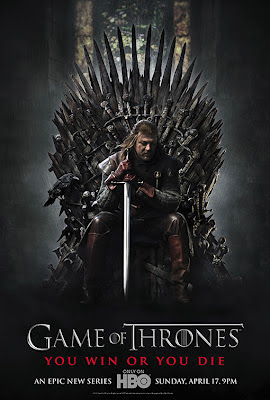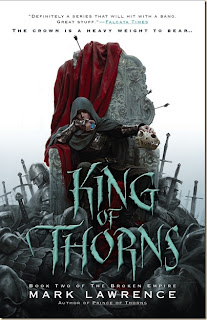Back in February of 2010, I read the first self-published Fantasy novel by Michael J. Sullivan, The Crown Conspiracy. I wanted to continue reading the series but the second novel in the Ryria revelations, Avempartha, never reached the top of my reading pile. However, when Orbit picked up the six book series to publish as three omnibuses, my attention went back to Sullivan. Theft of Swords (The Crown Conspiracy & Avempartha) was released at the end of last year and was closely followed by Rise of Empire (Nyphron Rising & The Emerald Storm) and Heir of Novron (Wintertide & Percepliquis).
Royce Melborn, a skilled thief, and his mercenary partner, Hadrian Blackwater, make a profitable living carrying out dangerous assignments for conspiring nobles—until they are hired to pilfer a famed sword. What appears to be just a simple job finds them framed for the murder of the king and trapped in a conspiracy that uncovers a plot far greater than the mere overthrow of a tiny kingdom.
Can a self-serving thief and an idealistic swordsman survive long enough to unravel the first part of an ancient mystery that has toppled kings and destroyed empires in order to keep a secret too terrible for the world to know?
As I mentioned, I have already read and reviewed The Crown Conspiracy (here). Starting from the previous review and by taking account more particularly of the following elements...
[I think the whole series will probably appeal more to me than this instance alone. The fact that it was a short read probably has something to do with it. It's not a fault but it can shorten considerably the time to be immersed in Sullivan's world and appreciate the characters.]
[I would recommend this book mostly if you intend to read the full series, although I hope to confirm this soon since I have only read the first book so far. This is good old fantasy well executed and just addictive enough to make me want more.]
...for the review of Theft, I will consider the novel as a whole even if you could still read them as two separate books easily enough.
Theft of Swords is clearly set upon traditional Fantasy bases, finding its voice, without embarrassment, in the common tropes. Honorable thieves, an evil clergy reaching into every kingdoms with a dark plan in mind, a lost heir waiting to re-appear, the races (humans, dwarves, elves, goblins...), magical artefacts, etc. If you've grown tire of these foundations for your Fantasy novels, you may think that should stay away from this one but that wouldn't be completely fair. Yes, they are at the core of the book and are not denatured but they don't feel cheesy. As with every book, without pointing out the genre, these elements alone are not an exhaustive list of what is making a book interesting.
Taken separately, the first two books feel more like sword and sorcery adventures than epic Fantasy (though they are clearly marketed as such by making them a trilogy). I think that sword and sorcery enthusiasts will find they share in Theft of Swords even more than the epic crowd. Sullivan mentioned that the books were written with an episodic structure in mind where sub plots would eventually emerge as the main thread, becoming more world-class. In the first book, these kinds of things were only hinted at. However, by the end of Theft, you have a pretty good idea of where the author is heading. Here again, we face an aspect that has some drawbacks. Is the plot too obvious? It's too soon to tell but it seems that were in for a mix of obvious denouements and surprising stratagems.
Character wise, Royce and Hadrian are used as stars by Sullivan. Their narrative is much more developed than the other protagonists and the scenes in which they appear are usually at the center of the action. I already told you that they are gold-hearted thieves but they also serve to bring some cheerfulness to the book. I would compare them to some kind of double act and most of the time they are quite entertaining, with a sidekick and a straight man but with some variations between the roles. They have known each other for a long time but they both still have a shrouded past. In the end, are they compelling enough to withstand the whole story on their shoulders? I think so, but barely.
The people they are scrambling and struggling with also have their value but usually their threads are not long enough to become memorable. In the case of the villains, which I'm not afraid to call so since aside from the thieves, the characters in Sullivan world are in the black and white ends of the spectrum. Generally, for the Church and their subordinate, the depth of characterization is not profound but some exceptions from all this come from Esrahaddon the mage and the Myron the monk. Speaking of which, he is sorely missed from the second part of the tale and I remember saying this about him...
[The use of Myron the scholar/monk reminded me quite of lot of Stephen Daridge (from Greg Keyes's A Kingdom of Thorn and Bone) (and there's this power-hungry behind the scene church...). For "use" I mean as way of helping the characters decipher ancient texts, be a "portable" source of knowledge and produce a good quantity of history for the world. I felt at times that it was overly exploited but in the end it served the worldbuilding well (even though it's still a little thin) and probably helped with the pace since info dumping was not necessary aside from Myron's discussions.]
...and hopefully, the world of Elan that seemed a bit simple became more intriguing with the addition of the old war between the elves and the Novron empire from the mouth of the mage.
Some sub plots and conniving adversaries are present and some twists still come as a surprise but the main ideas are not particularly complex, mostly so for the Church and their ambitions. The narrative also follows the same kind of principle. The pace and action make the flow of the book feel constant and not too expeditious and the dialogues are effective but conventional and the themes approached in the book, righteousness, power, friendship to mention a few are traditional.
My feeling after reading Crown alone was that it was a good debut but a bit of a clumsy act. With the story of Avempartha annexed to it, that feeling remains but starts to lessen. My hope and my expectations for the rest of the series are greater with Theft as a whole but I don't think that my overall score for the book will go up although some elements like the world building and the story deserve more. One thing is certain though, with one goal from the authors being to creation of a story that makes you want to read more and continue to the end, in this, Michael succeeded. I will surely pick up Rise of Empire.
Technically, I think that the Orbit cover is nice. I liked the illustrations/paintings done by Michael on his self-published books but the new ones really catch the eye. The paperback edition of the novel stands at 649 pages. There's a great glossary at the end of the book and the map of Elan is beautifully detailed and is also available on the web (link at the index).
Theft of Swords review score :
World building............... 7.5 / 10
Magic system................. 7 / 10
Story.............................. 7.5 / 10
Writing........................... 7.5 / 10
Overall (not an average) 7.5 / 10
Enjoy!
Micheal J Sullivan page























































